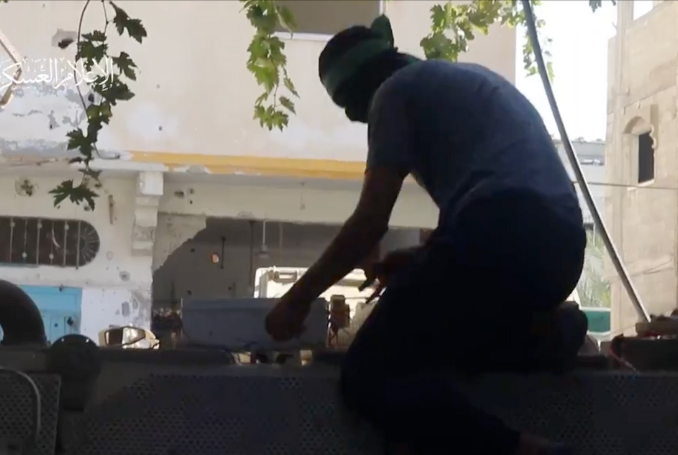
The guerrilla tactics employed by the Palestinian Resistance in Gaza make it difficult for the Israeli army to defeat it, the New York Times reported, citing military analysts and Israeli soldiers.
According to the report, the confrontation on the ground has turned into a war of attrition. While Israel’s military might surpasses the Resistance in scale and technology, the Brigades in Gaza have refined their strategy to maximize the advantages of asymmetric warfare.
“The fighters emerge briefly in small units to booby trap buildings, set roadside bombs, attach mines to Israeli armored vehicles or fire rocket-propelled grenades at Israeli forces before attempting to return underground,” the paper said, adding:
“While Hamas cannot defeat Israel in a frontal battle, its small-scale, hit-and-run approach has allowed it to continue to inflict harm on Israel and avoid defeat.”
This enduring resilience has raised questions about the long-term viability of Israel’s military strategies in Gaza and the broader implications for the region.
Blowing up Israeli Explosives – Resistance Roundup – Day 381
The Times cited Turkiye-based Palestinian analyst Salah al-Din al-Awawdeh as saying that “the guerrilla forces are working well and it will be very difficult to subdue them — not just in the short run, but in the long term”.
Israel claims to have destroyed the Resistance’s long-range rocket caches. However, according to al-Awawdeh, even if that were the case, “there are still endless explosive devices and light arms at hand.”
The Times noted that “some of those explosives were stockpiled before the start of the war” while “others are repurposed Israeli munitions that failed to explode on impact, according to both Hamas and the Israeli military”.
Indeed, one of the latest videos published by the Al-Qassam Brigades shows Palestinian fighters turning an unexploded Israeli missile into an improvised device.
According to the paper, the death of Hamas’ political leader Yahya Sinwar, who was killed during clashes in the Tel Al-Sultan area on October 16, “is unlikely to affect the capacity of the Hamas fighters in northern Gaza, according to Israeli and Palestinian analysts.”
“Time and again, Israeli soldiers have forced Hamas from a neighborhood, only to retreat within weeks without handing power to Hamas’s Palestinian rivals,” the report noted.
The killing of Colonel Ihsan Daksa, Commander of the 401st Brigade and in charge of the military operation in the northern area of Jabaliya, demonstrates the Resistance’s ability to restore its military capabilities.
Killing a Colonel, and Then Some – Resistance Roundup – Day 380
“Israel’s current campaign in Jabaliya in northern Gaza, where Colonel Daksa was killed, is at least its third operation there over the past year,” the Times reported.
The report also cited Michael Milstein, an Israeli analyst of Palestinian affairs as saying that “We occupy territories, and then we get out” and that “this kind of doctrine means that you find yourself in endless war.”
The difficulties met by the Israeli army in its military operation in northern Gaza led Israeli military officials to elaborate criminal plans to depopulate the area.
“A prominent former Israeli general, Maj. Gen. Giora Eiland (…) has publicly pressed Israel’s government to depopulate northern Gaza by cutting off food and water,” the paper reported.
The destruction of an Israeli Merkava tank with a highly explosive device east of Jabaliya camp, north of the Gaza Strip.
Translation note 00:51
From Jabalia camp, we dedicate this operation to our fighting Sheikh, leader Yahya Sinwar “Abu Ibrahim” who ascended advancing… pic.twitter.com/4LtqVTJRg6
— The Palestine Chronicle (@PalestineChron) October 20, 2024
“They will face two alternatives: either to surrender or to die of starvation,” General Eiland, a former director of Israel’s national security council, said in an interview.
The Rome Statute of the International Criminal Court includes starvation as a war crime when committed within an international armed conflict.
However, during the one-year genocide, human rights groups have repeatedly exposed Israel’s use of starvation as a weapon of war.
“The Israeli government is using starvation of civilians as a method of warfare in the Gaza Strip, which is a war crime,” Human Rights Watch said in a statement last December.
(The Palestine Chronicle)
